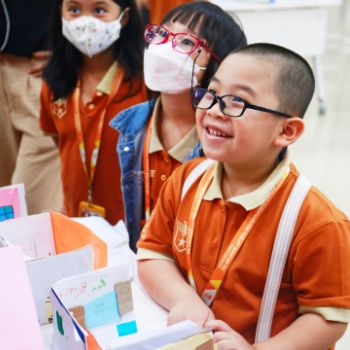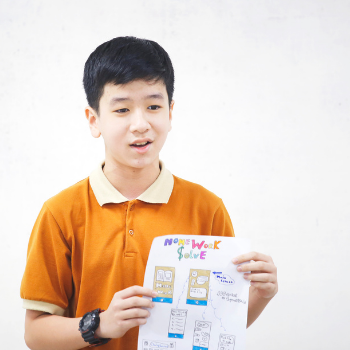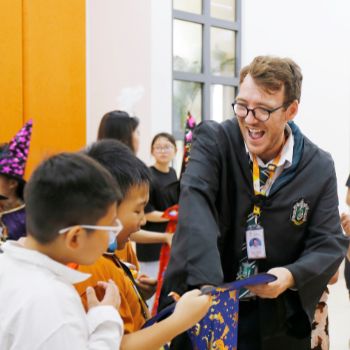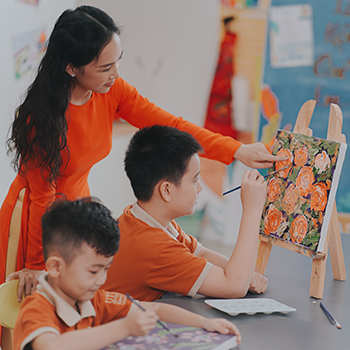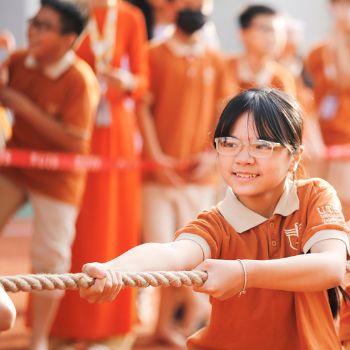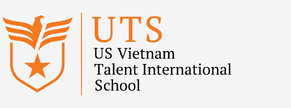The House System is a commonly used concept in international education systems, aiming to establish environments and avenues for students to explore, uncover their identities, and undergo holistic development. Throughout the academic year, a diverse range of house competitions and events are organized to promote teamwork, responsibility, personal talents, and, perhaps most crucially, fostering a tight-knit learning and living environment, where students receive ample support and nurturing not just from educators but also from fellow members of the UTS Community.
At UTS, we have 06 Houses, in alphabetical order, Aquamarine, Citrine, Emerald, Ruby, Sapphire and Topaz. The names were chosen with the belief that each of our students possesses a distinct talent, much like a gemstone adorned with unique colors, and attributes, and the role of educators at UTS is to hone, nurture and unleash their talents so that they can thrive. The UTS House System Program places its emphasis on the following aspects:
- Global Citizenship and Sustainability
- Wellbeing
- Intercultural Learning
Commencing from the Academic Year 2022-2023, the UTS House System has seamlessly integrated itself as an indispensable component of the school’s commitment to delivering holistic education. Consequently, membership in the UTS House System has become a mandatory requirement for all students and staff.
Each UTS House encompasses the following attributes:
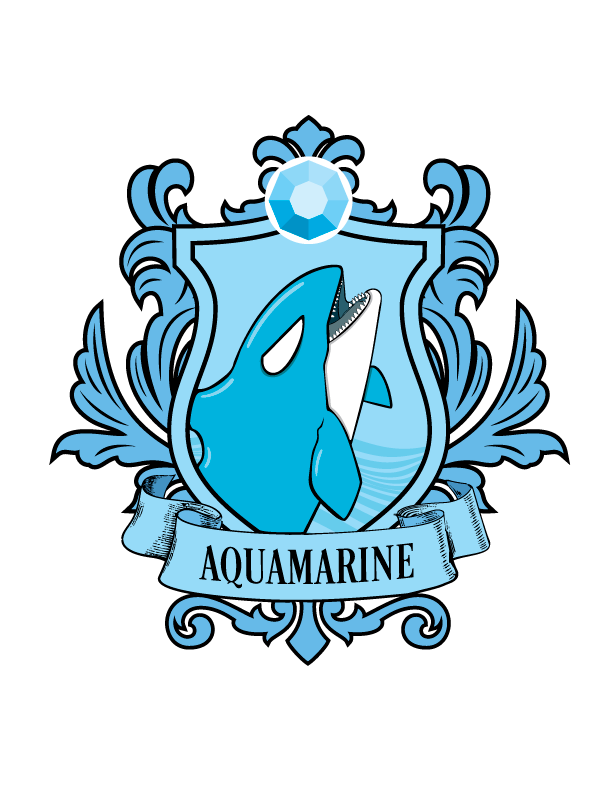
Aquamarine Color: Light Blue Value: Courage |

Citrine Color: Gold Value: Creativity |

Emerald Color: Green Value: Lifelong Learning |

Ruby Color: Red Value: Respect |
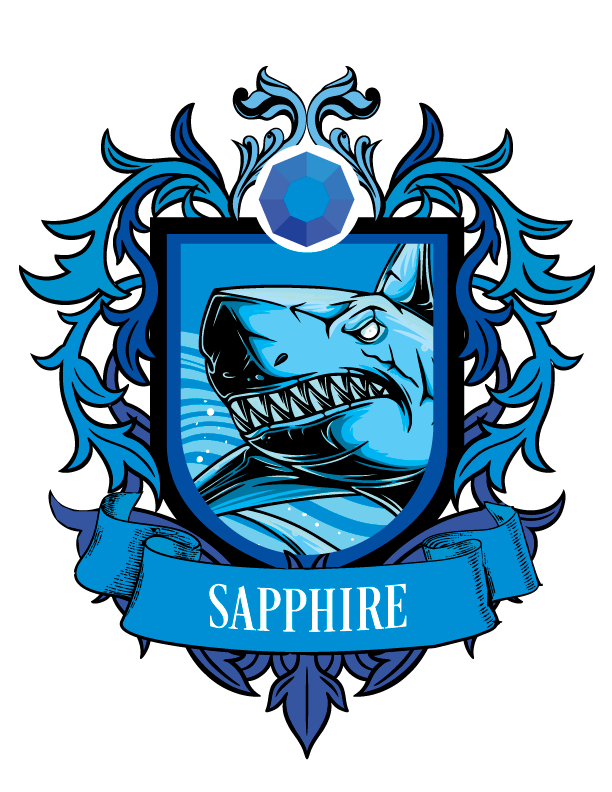
Sapphire Color: Dark blue Value: Integrity |
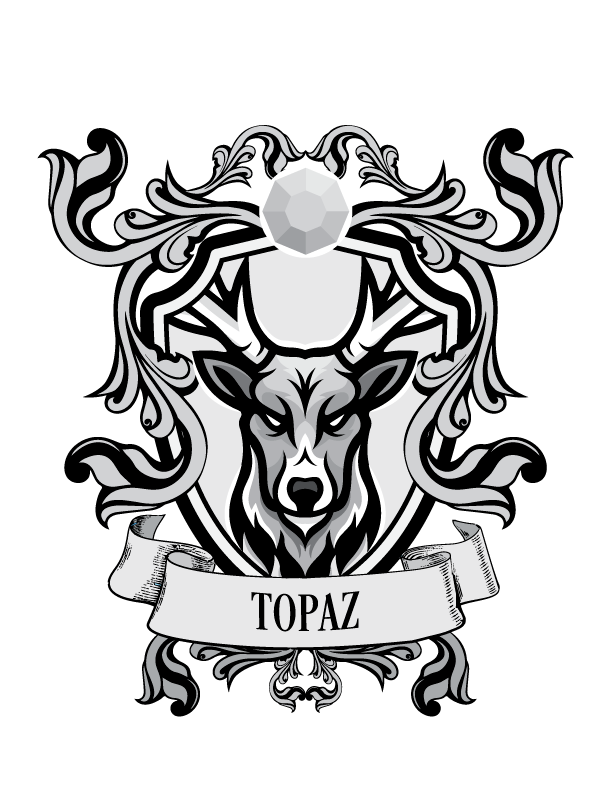
Topaz Color: Silver Value: Contribution |
Upon enrollment, all students from grade 3 to grade 12 are assigned randomly to an exclusive house, ensuring a balanced representation of both girls and boys, thereby promoting diversity and inclusivity at every turn. Notably, siblings are also administered into the same House, which allows for better orientation and familiarity. Once a student has been allocated to a House, they usually remain in that House as they progress through different year groups.
As a demonstration of their allegiance and loyalty to their respective houses, every student and staff member is encouraged to wear the House shirt on days when UTS House competitions and events occur. This practice serves as a visible symbol of their connection to their House and fosters a sense of unity and camaraderie among the participants.
At UTS, students of Primary and Secondary Schools engage in separate divisions within the House system. The Activity Programs designed for these divisions slightly differ, taking into consideration age appropriateness. The events encompass a wide array of activities ranging from sports, debating, art, and music competitions, all aimed at showcasing the values of global citizenship, sustainability, wellbeing, and intercultural learning.
The Program encompasses two distinct categories in which students will compete: House Academics and House Events.
House Academic Competition (Two divisions)
02 divisions: Primary (G3-5) and Secondary (G6-12) will compete separately.
- Form of competition: Each individual accumulates points for their respective House, and the House with the highest score emerges as the winner in this category.
- Students will actively strive to accumulate House points through demonstrating excellent work or displaying a positive attitude in various classroom situations, which represents the 06 UTS Core Values of the school:
- Integrity
- Respect
- Courage
- Contribution
- Lifelong Learning
- Creativity
House Event Competition (One division)
This particular category does not distinguish between Primary and Secondary levels; instead, each House competes as a team rather than as individuals, as seen in the Academic category. All competitions and activities of this category will be primarily concentrated in the final week of each month.
The House system is built on two major pillars:
- To begin, the UTS House System places a strong emphasis on fostering teamwork and collaboration skills among students. UTS actively supports and acknowledges outstanding teams, and every member is encouraged to actively contribute to the overall group’s success.
- Furthermore, UTS aims to instill in its students the understanding that every effort they put forth, regardless of its scale, holds significant meaning and imparts certain values to them. At UTS, we firmly believe that “Every child is a talent,” and this belief does not prescribe that they must be exceptionally “smart” to be considered talented or successful. We actively promote participation, practice, and continuous learning for every student. Consequently, we wholeheartedly celebrate and encourage every endeavor, no matter how big or small.
At the conclusion of each school year, UTS conducts a ceremony to unveil the Primary and Secondary Champions. This event serves as a culmination of the year-long operation of the House System, honoring the commitment and remarkable accomplishments of participating students.
The awards achieved encompass:
- In the Academic category, the Primary School Champion will be awarded a Silver Trophy, while the Secondary School Champion will receive a Gold one.
- In the Event category, both Primary and Secondary levels will vie for the coveted Event Shield as the Champion award.
- These trophies and shields will be prominently showcased in the lobby, symbolizing collective excellence and serving as a wellspring of inspiration for all members of the UTS community.
1. Creativity: giving our students the space to define themselves as special and unique, promoting meaningful learning experiences to bring out all the talents of every student.
2. Contribution: making sure our students learn about where they come from and that they believe and understand why they should give back to their communities – at school, local, national, and international levels.
3. Courage: allowing our students to self-actualize and take risks, standing up for the things they believe in and challenging the status quo. It means overcoming our own limitations while staying true to who we are.
4. Integrity: building a willingness in our students to accept their faults and grow from them, being truthful, authentic, and reliable. Our teachers and staff act as role models for the behavior we expect of all members of our community.
5. Lifelong learning: fostering an intrinsic value in education for our students and teachers that arouses our interest in our community and the greater world.
6. Respect promoting an acceptance of multi-culturalism and of people that are different than us. It means respect for the environment, for our communities and for building social justice.
These definitions will serve as a fundamental framework for our educators to harness their creativity in constructing lessons and reward systems, tailored to their unique preferences and the needs of their students.
For teachers without a customized reward system, the subsequent criteria can be consulted as a guide for awarding House points to students:
| CREATIVITY |
1. Originality Creative students are not limited by traditional ways of thinking. They can see problems from new perspectives, think outside of the box and come up with unique solutions. 2. Resourcefulness Students use available materials, tools, and resources creatively to achieve their goals. 3. Curiosity Students are curious and open to new ideas. They are not afraid to ask questions and seek out information that can help them solve problems or create new things. 4. Open-mindedness Students embrace different viewpoints and opinions, valuing the diversity of ideas and perspectives in group discussion/ activities. 5. Expression Students communicate their ideas effectively through various mediums such as writing, art, music, or multimedia. 6. Reflection Students critically analyze their own work, seeking feedback and making improvements based on self-evaluation. 7. Perseverance Students persist in their creative endeavors, even when faced with setbacks or obstacles, displaying determination and resilience. 8. Problem-solving Students demonstrate an ability to analyze problems from multiple angles and propose creative, innovative solutions. 9. Flexibility Students demonstrate flexibility and adaptability in response to changing circumstances or new information. 10. Collaboration |
| LIFELONG LEARNING |
1. Curiosity
2. Persistence Students exert their utmost effort in assigned tasks, demonstrating resilience by not yielding easily. They persist until completion, and they value their accomplishments, even the most minor ones. When confronted with challenges or setbacks, students endeavor to either begin anew or seek out solutions. 3. Creativity Students engage in creative thinking, generating novel and daring ideas, and showcase their creativity through various accomplishments and achievements. 4. Problem-Solving Students actively seek solutions to every problem, employing clear thinking and decision-making skills. They are resourceful in finding their own solutions to challenges, yet they are also willing to seek guidance and support from teachers when needed. 5. Communication Students articulate their thoughts clearly, actively engage in listening, and communicate effectively with others. They make active use of spoken language to express their thoughts and emotions. 6. Empathy Students possess the capacity to comprehend and share emotions with one another. They are adept at viewing problems from others’ perspectives and consistently display kindness and compassion towards everyone. 7. Responsibility Students take responsibility for their actions, adhere to rules, and carry out tasks independently. They demonstrate a sense of ownership in their actions and diligently fulfill their responsibilities. 8. Collaboration Students excel in collaborative efforts, sharing ideas, and reaching compromises with their peers. It is encouraged for students to engage in group projects and practice taking turns, fostering teamwork and cooperation. 9. Adaptability
10. Self-Reflection
|
| RESPECT |
1. Classroom Behavior
2. Peer Interaction
3. Respect for Authority
4. Digital Citizenship
5. School Ground Behavior
6. Conflict Resolution
7. Community Behavior
|
| CONTRIBUTION |
1. Volunteer Work Actively participate in volunteer activities organized by the school, such as community service projects, charity drives, or events that benefit others. 2. Leadership Initiatives Take the initiative to lead or organize projects that contribute to the school’s development. Participate in eco-friendly initiatives, such as recycling programs, clean-up campaigns, or projects that promote sustainability. 3. Academic Support Offer assistance and support to their peers in academic matters, such as tutoring, study groups, or mentoring, helping others excel academically. 4. Creative Contributions Share their creative talents, whether through art, music, writing, or others enriching the school’s cultural and artistic environment. 5. Inclusive Actions Consistently work to create an inclusive and welcoming atmosphere for all members of the school community. 6. Sportsmanship and Teamwork Students consistently exhibit good sportsmanship, teamwork, and collaboration, both within their classes and during extracurricular activities. 7. Organizational Involvement Students engage in various school clubs, organizations, or committees, contributing to the planning and execution of events that enhance the school experience. 8. Acts of Kindness Perform acts of kindness without seeking recognition, spreading positivity and compassion throughout the school community such as peer support, acts of environmental kindness, etc. 9. Continuous Improvement Seek ways to improve themselves and the school environment, showing dedication to personal growth and the betterment of the community. 10. Green Actions for a Cleaner School Take steps to enhance the school’s eco-friendly environment. This includes throwing trash in the right place, planting trees, taking care of shared areas, and reminding everyone to keep things clean and tidy. |
| COURAGE | 1. Standing up for others
Whether this be injustice in or out of the classroom, students show an ability to stand up to injustice. This could be in classroom discussions or in more physical situations in the classroom. 2. Supporting others Students actively seek out to help others through work in class or more physically in the classroom or in school. Students can help academically or even those younger than them who get lost or need assistance. 3. Stance against bullying Students speak out for those who are bullied and stand with them. There are many reasons why some students can be made victims in the classroom by others, and those that side with them should be rewarded. 4. Seeking Help Students exhibit courage when they openly acknowledge their challenges or seek assistance. This can manifest as raising their hand to ask questions when uncertain about a topic during class, displaying perseverance in the quest for answers to particular subjects, or taking proactive steps to access mental health support. 5. Leadership Students who take leadership roles in class, on projects. Monitors do a particularly good job. 6. Public speaking Students courageously present in front of their classmates or the entire school, perform a creative piece in front of the school community, etc. 7. School performance Students actively take part in school performances and events such as the school plays or formal ceremonies. 8. Representing the school Students represent the school in sporting events such as basketball, swimming and other competitions. |
| INTEGRITY |
1. Honesty in Assignments Students should complete their assignments honestly, without plagiarizing or cheating. They should properly cite sources and give credit where it is due. 2. Respect for Others Students should respect the ideas, work, and personal space of their peers. They should not engage in any form of academic dishonesty that may harm others or undermine their learning experience. 3. Adherence to Academic Policies Students should follow the academic policies and guidelines set by the institution or instructor, including rules on attendance, participation, and submission of work. 4. Proper Use of Technology Students should use technology responsibly and ethically in the classroom. They should not use electronic devices or online resources to cheat or gain an unfair advantage. 5. Engagement and Participation Students should actively engage in classroom discussions, activities, and group work. They should contribute their own ideas and thoughts while respecting the contributions of others. 6. Responsible Test-Taking Students should take tests and exams honestly, without using unauthorized materials or seeking assistance from others unless explicitly allowed by the instructor. 7. Reporting Academic Misconduct Students should report any instances of academic misconduct they witness to the appropriate authority, such as the instructor or academic integrity office. |
Since each teacher may employ their unique approach to awarding points within their classrooms, ensuring fairness throughout the year, the UTS House System has established the following regulations for point calculation:
1. Daily, Weekly, or Monthly Reporting: Each teacher will report the House scores for all their classes regularly, be it daily, weekly, or at the end of each month, using the designated House score entry application. The system will automatically calculate each student’s score after each entry.
2. Point Conversion: Commencing on the 25th of each month, the system will initiate the ranking of class members based on their final total scores. Points will be converted according to the following rankings:
-
Top 1: +10 points for their respective House.
-
Top 2-5: Each will contribute +8 points to their respective House.
-
Top 6-10: Each will contribute +5 points to their respective House.
-
Top 11-15: Each will contribute +3 points to their respective House.
In cases where students have equal scores, they will share the same rank.
For students who fall outside the top 1 to top 15 ranks but have still earned points, they will receive a bonus of +1 point for their respective House.
However, for students who have not earned any points, there will be no addition of points to their corresponding House.
Each month of the school year will be assigned one of the six UTS Core Values. Accordingly, at the end of each month, teachers will select students who have been a star in demonstrating that value in learning. For these students, each will also receive 10 House points for their respective House apart from the small recognition gift from the Academic Management Team.
Students who participate in the following competitions also receive incentive points for their respective Houses:
1. International Mathematics Contest
2. Thailand International Mathematical Olympiad
3. Singapore & Asian Schools Math Olympiad
4. World Scholar’s Cup
5. Genius Olympiad
6. International Kangaroo Math Contest
7. Universal Competition of Educational Poster
8. Youth Friendship for Peace, Asia Pacific Arts Festival
9. Syllabus World Championship 2023
10. Global Junior Math Aptitude Test
11. HongKong International Mathematical Olympiad
12. Eurasian Spelling Bee
13. Vietnam Science and Engineering Fair (VISEF)
14. International Science and Engineering Fair (ISEF)
15. Robotacon WRO (World Robot Olympiad)
16. HCMC Badminton Competition
17. Green Drawing Contest
18. Go Vap Sports Competitions
19. Go Vap competition for the gifted
20. HCMC competition for the gifted
21. VIOEDU
Note:
This list serves as a reference only. All awards must be recognized by UTS Academic Management Team to be awarded House points.
| Achieved an individual award in the cultural subject’s excellence exam. |
|
| Achieved individual and team awards in experimental competition in Physics, Chemistry, Biology; scientific and technical competition; International letter writing organized by the Education sector in collaboration with professional disciplines from the provincial level and above. |
For individual prizes:
|
| Achieved individual prizes in international competitions |
National Finals:
In case there is no Excellent Award, it will be calculated as follows:
International Finals:
|
| Rank | Group Points |
| 1st place | +6 points |
| 2nd place | +5 points |
| 3rd place | +4 points |
| 4th place | +3 points |
| 5th place | +2 points |
| 6th place | +1 points |
| Won individual and team prizes in art competitions; sports; National defense education sports festival organized by the Education sector in collaboration with professional disciplines from the provincial level and above. |
For individual prizes:
|
| Achieved individual prizes in international competitions |
National Finals:
In case there is no Excellent Award, it will be calculated as follows:
International Finals:
|


